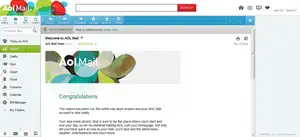 A screenshot of AOL Mail inbox in January 2014. | |
Type of site | Web application (E-mail, webmail) |
|---|---|
| Available in | 54 languages |
| Owner | AOL |
| URL | mail |
| Commercial | No |
| Registration | Required |
| Current status | Online |
Content license | Proprietary |
AOL Mail (stylized as Aol Mail.) is a free web-based email service provided by AOL, a division of Yahoo! Inc.
Features
AOL Mail has the following features available:
- Email attachment limit: 25 MB[1]
- Max mailbox size: Unlimited[2] New accounts seem to be limited to 1 TB.
- Supported protocols: POP3, SMTP, IMAP[3]
- Link to other email accounts from other service providers (such as Gmail and Hotmail).
- Ads: are displayed while working with the email account. Embedded links within emails are automatically disabled and can only be activated by the email user.
- Spam protection[4][5]
- Virus protection[6]
- Spell checking
- Domains: @aol.com and previously @love.com, @ygm.com (short for you've got mail), @games.com, and @wow.com[3]
- Supports TLS/HTTPS after login[7]
If an AOL Mail account is inactive for 90 days, it may become deactivated, at which point any emails sent to it may not be delivered and may be returned to sender. After 180 days of inactivity, the account may be deleted.[8]
History
In 1993, both America Online (AOL) and Delphi started connecting their proprietary e-mail services to the Internet.[9]
As of October 1997, AOL Mail was the world's largest e-mail provider, with around 9 million subscribers[10] (identical with the number of AOL subscribers).[11]
In 1997, AOL launched NetMail, a web-based version of its e-mail service. It was initially criticized for only working on Internet Explorer, but a later Java-written version ensured compatibility with Netscape Navigator.[12] The service was renamed AOL Mail on the Web in December 1999.[13]
In January 2001, an e-mail alert service for text-based digital cellphones and pagers was launched.[14]
In 2004, AOL tested a new free webmail service for the public, without the need of customers subscribing to AOL. This was done in an effort to compete better against MSN Hotmail, Yahoo! Mail and Gmail.[15] The service launched in May 2005 under the name AIM Mail, with 2 gigabytes of mail storage and tightly integrated with AOL Instant Messenger (AIM). It is based on technology from MailBlocks, which AOL acquired in 2004.[16]
From August 2006, AOL became entirely free of charge for broadband users.[17][18] The same month, Netscape Mail was migrated to AIM Mail.[19]
In November 2010, AOL released Project Phoenix, an email application program that features a Quick Bar where emails, text messages, and AOL Instant Messenger messages can be sent from one area. It also lets people add up to five accounts into it.[20] In 2012, AOL released the Alto Mail software.
As of July 2012, there were 24 million AOL Mail users.[21] By 2021, the number of paying users had dropped to 1.5 million. [22]
On March 16, 2017, Verizon, which had acquired AOL in 2015, announced that it would discontinue its in-house email services for internet subscribers, and migrate all customers to AOL Mail.[23]
See also
References
- ↑ "AOL Postmaster". postmaster.aol.com. Retrieved February 20, 2019.
- ↑ Wenzel, Elsa. "AOL Mail offering unlimited storage, integrated chatting". CNET. Retrieved November 8, 2020.
- 1 2 AOL's 'Project Phoenix' e-mail overhaul is here, CNET, October 14, 2010, retrieved February 20, 2019
- ↑ Nick Davis. "How to Block Email Addresses in AOL". Houston Chronicle. Retrieved February 20, 2019.
- ↑ "America Online Acquires Mailblocks". August 4, 2004. Retrieved February 20, 2019.
- ↑ Help.aol.com Archived April 23, 2013, at the Wayback Machine
- ↑ Help.aol.com Archived August 19, 2014, at the Wayback Machine
- ↑ "Does my AOL Mail account get deactivated if I don't use it for 90 days?". help.aol.com. AOL. June 1, 2016. Archived from the original on February 20, 2019. Retrieved February 20, 2019.
- ↑ Email History Retrieved February 20, 2019.
- ↑ "Hotmail (1) - Land of the free". Irish Times. October 27, 1997.
- ↑ Richard Wray and Dan Milmo (August 3, 2006). "AOL tries to survive by going free". The Guardian.
- ↑ Festa, Paul (December 15, 1997). "AOL's NetMail not universal". CNET.
- ↑ "America Online Launches AOL Mail on the Web". Warner Media. November 22, 1999.
- ↑ "AOL Launches E-Mail Alert Service". ABC News. January 9, 2011. Retrieved February 20, 2019.
- ↑ Jim Hu (December 22, 2004). "AOL gets ready to launch free Web e-mail". ZDNet.
- ↑ John Leyden (June 7, 2005). "AOL launches free 2GB webmail service". The Register. Retrieved February 20, 2019.
- ↑ Joseph Weisenthal (August 2, 2006). "About Time: AOL Goes Free". Retrieved February 20, 2019.
- ↑ Saul Hansell and Richard Siklos (August 3, 2006). "In a Shift, AOL Mail to Be Free". The New York Times. Retrieved February 20, 2019.
- ↑ Fernando Cassia (July 19, 2006). "Netscape WebMail to be killed by AIM after Calacanis experiment". The Inquirer. Archived from the original on November 21, 2009. Retrieved February 20, 2019.
{{cite news}}: CS1 maint: unfit URL (link) - ↑ Caroline McCarthy (November 14, 2010). "AOL's Project Phoenix overhaul is here". CNET. Retrieved February 20, 2019.
- ↑ Sean Ludwig (July 26, 2012). "To keep its 24M users from fleeing, AOL redesigns Mail with much sharper look". VentureBeat. Retrieved February 20, 2019.
- ↑ Sherman, Alex (May 3, 2021). "About 1.5 million people still pay for AOL — but now they get tech support and identity theft services instead of dial-up internet". CNBC. Retrieved May 17, 2022.
- ↑ Baumgartner, Jeff (March 16, 2017). "Verizon Dropping Its Email Business". Multichannel News. Retrieved February 20, 2019.
External links